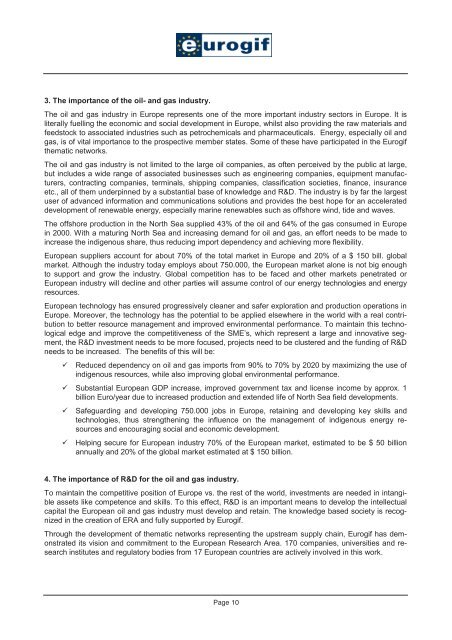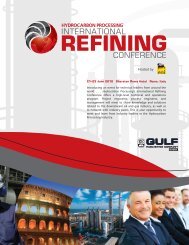Oil & Gas Industries Technology Master Plan - GEP
Oil & Gas Industries Technology Master Plan - GEP
Oil & Gas Industries Technology Master Plan - GEP
Create successful ePaper yourself
Turn your PDF publications into a flip-book with our unique Google optimized e-Paper software.
3. The importance of the oil- and gas industry.<br />
The oil and gas industry in Europe represents one of the more important industry sectors in Europe. It is<br />
literally fuelling the economic and social development in Europe, whilst also providing the raw materials and<br />
feedstock to associated industries such as petrochemicals and pharmaceuticals. Energy, especially oil and<br />
gas, is of vital importance to the prospective member states. Some of these have participated in the Eurogif<br />
thematic networks.<br />
The oil and gas industry is not limited to the large oil companies, as often perceived by the public at large,<br />
but includes a wide range of associated businesses such as engineering companies, equipment manufacturers,<br />
contracting companies, terminals, shipping companies, classification societies, finance, insurance<br />
etc., all of them underpinned by a substantial base of knowledge and R&D. The industry is by far the largest<br />
user of advanced information and communications solutions and provides the best hope for an accelerated<br />
development of renewable energy, especially marine renewables such as offshore wind, tide and waves.<br />
The offshore production in the North Sea supplied 43% of the oil and 64% of the gas consumed in Europe<br />
in 2000. With a maturing North Sea and increasing demand for oil and gas, an effort needs to be made to<br />
increase the indigenous share, thus reducing import dependency and achieving more flexibility.<br />
European suppliers account for about 70% of the total market in Europe and 20% of a $ 150 bill. global<br />
market. Although the industry today employs about 750.000, the European market alone is not big enough<br />
to support and grow the industry. Global competition has to be faced and other markets penetrated or<br />
European industry will decline and other parties will assume control of our energy technologies and energy<br />
resources.<br />
European technology has ensured progressively cleaner and safer exploration and production operations in<br />
Europe. Moreover, the technology has the potential to be applied elsewhere in the world with a real contribution<br />
to better resource management and improved environmental performance. To maintain this technological<br />
edge and improve the competitiveness of the SME’s, which represent a large and innovative segment,<br />
the R&D investment needs to be more focused, projects need to be clustered and the funding of R&D<br />
needs to be increased. The benefits of this will be:<br />
Reduced dependency on oil and gas imports from 90% to 70% by 2020 by maximizing the use of<br />
indigenous resources, while also improving global environmental performance.<br />
Substantial European GDP increase, improved government tax and license income by approx. 1<br />
billion Euro/year due to increased production and extended life of North Sea field developments.<br />
Safeguarding and developing 750.000 jobs in Europe, retaining and developing key skills and<br />
technologies, thus strengthening the influence on the management of indigenous energy resources<br />
and encouraging social and economic development.<br />
Helping secure for European industry 70% of the European market, estimated to be $ 50 billion<br />
annually and 20% of the global market estimated at $ 150 billion.<br />
4. The importance of R&D for the oil and gas industry.<br />
To maintain the competitive position of Europe vs. the rest of the world, investments are needed in intangible<br />
assets like competence and skills. To this effect, R&D is an important means to develop the intellectual<br />
capital the European oil and gas industry must develop and retain. The knowledge based society is recognized<br />
in the creation of ERA and fully supported by Eurogif.<br />
Through the development of thematic networks representing the upstream supply chain, Eurogif has demonstrated<br />
its vision and commitment to the European Research Area. 170 companies, universities and research<br />
institutes and regulatory bodies from 17 European countries are actively involved in this work.<br />
Page 10








![%LODQV pQHUJpWLTXHV HW JD] j HIIHW GH VHUUH ... - GEP](https://img.yumpu.com/29947973/1/184x260/lodqv-pqhujpwltxhv-hw-jd-j-hiihw-gh-vhuuh-gep.jpg?quality=85)
